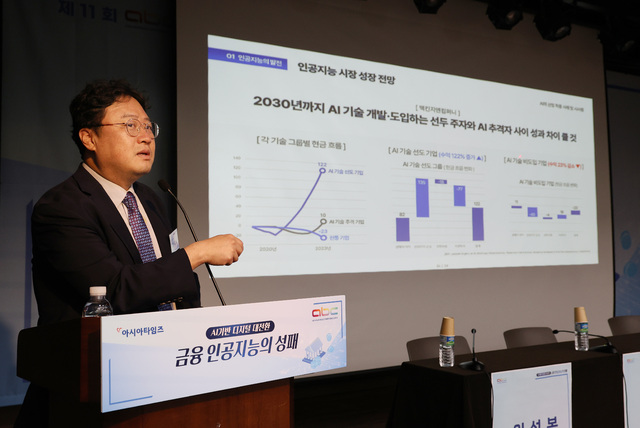
Jaesik Choi, a professor at KAIST's AI Graduate School and head of the Explainable Artificial Intelligence Center, said on the 9th, "The development of artificial intelligence (AI) technology will bring about great economic effects," adding, "In an era when carbon neutrality is becoming important, it is a very large energy source." “It will bring savings,” he emphasized.
At the 'Asia Business Conference 2024 (ABC2024)' held on this day at the Bank Hall in Jung-gu, Seoul and hosted by Asia Times under the theme of 'AI-based digital transformation - success or failure of financial artificial intelligence', Professor Jaesik Choi gave the keynote on 'Industrial application cases and implications of AI'. In his lecture, he said, "The match between Lee Se-dol and AlphaGo in 2016 was a turning point in a major era," and "With the rapid improvement in image recognition performance, most of what we see with our eyes can be automated simply by receiving data." .
However, by 2030, the difference in performance between leaders developing and introducing AI technology and AI pursuers is expected to be large. McKinsey predicts that AI technology-leading companies will see a 122% increase in profits, while non-adopters will see a 23% decrease in profits.
Professor Jaesik Choi said, “China and the United States will see their gross domestic product (GDP) rise by 26.1% and 14.5%, respectively, thanks to AI technology, and up to 14% (375 million people) of the total working population will have their jobs affected by AI.” However, he predicted, “It will be difficult for other countries to exceed 15%.”
AI is already being introduced in many fields, including manufacturing, finance, medicine, aerospace and defense, energy, and automation.
Among the lighthouse factories selected by the World Economic Forum, 145 factories were selected, and 68 AI-related technologies were selected. A lighthouse factory is a factory that creates a new manufacturing performance model by actively utilizing the core technologies that drove the 4th Industrial Revolution.
Professor Choi said, "Four factories were selected in Korea, and 29 processes and 5 technologies were selected for each factory. By controlling the process with AI, safety can be increased and energy consumption can be reduced by nearly 40%." explained.
In finance, AI-based ETFs, electronic trading tools, and stock market risk prediction AI risk indicators are being launched. He said, “The reason AI performs credit evaluation is to control the flow of money, and in decision-making, AI quickly brings in a lot of information and directly or indirectly reflects it in decisions.” He added, “The growing influence of AI on the flow of money is “I’m sure,” he said.
In particular, he emphasized, “As downstream industries such as automobiles and shipbuilding transition to eco-friendliness, the steel industry must also transition to eco-friendliness,” adding, “Artificial intelligence will also bring about energy-saving effects.”
He said, "As a result of applying AI to the continuous galvanizing (CGL) process and designing it to predict and automatically control temperature, new information is received every 15 seconds, and the accuracy of prediction of physical properties, set temperature, and product quality is improved two hours from now. “It has the effect of improving quality competitiveness and reducing energy costs by 98%,” he said. “In the case of the cement firing process preheating room, the temperature deviation in the preheating room was reduced by 35% compared to the previous one, the amount of bituminous coal used was reduced by 5%, and the circular fuel replacement rate increased by 49%.” He explained, “carbon emissions were reduced and productivity improved by 3%.”
He added, “If we apply AI automatic control to companies that use a lot of carbon, we can reduce 6-7% of energy and strengthen industrial competitiveness.”
On the other hand, reliability of AI was considered an issue.
He said, "Existing products are deterministic and predictable. When you press the call button, it makes a phone call, and when you press the television remote control, the TV turns on." “There’s a lot of people wanting information and direction,” he said.
He continued, “Unpredictable information does not come in, so it can be wrong,” and suggested, “In the AI era, a different perspective from the existing one is needed. You must be able to ask questions and be able to make corrections.”
In relation to this, “Explainable AI is a technology that increases the reliability of artificial intelligence by explaining to consumers the decision process and reasons for financial loan screening results using artificial intelligence,” he said. “Korea is the world’s first in the world to conduct explainable artificial intelligence research.” “It is in an active situation, and the first funding is scheduled for this year after submitting an international standard,” he added.







